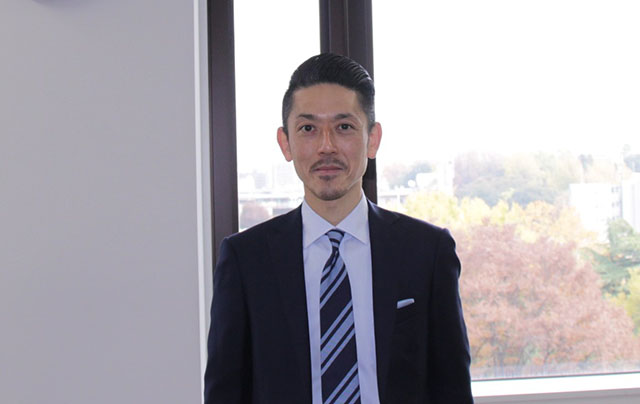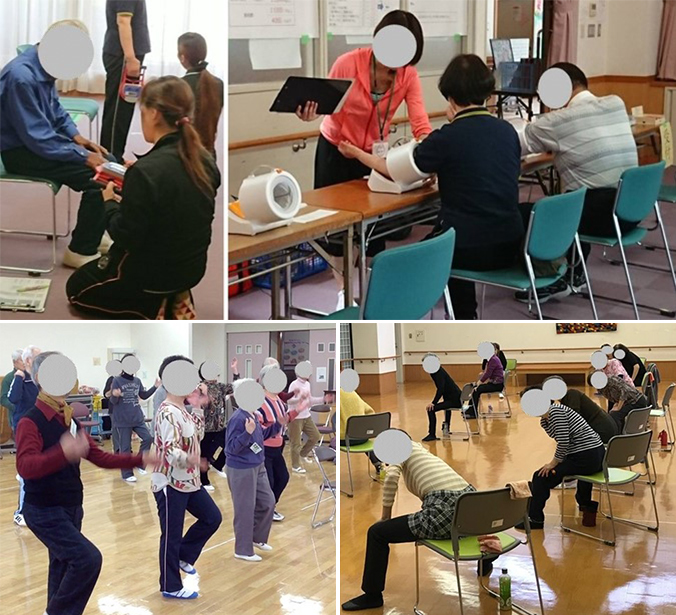TSUKUBA FUTURE
#104 Helping Elderly Adults Live Without Care
Professor YAMADA Minoru, Faculty of Human Sciences

Everyone ages. When we are young we think it will not happen to us, but deterioration of physical function is inevitable. To ensure that people remain healthy and independent in old age, it is important to pay attention to everyday lifestyle habits. Prof. Yamada is conducting research and implementing a variety of interventions, including efforts at regional and community levels, to ensure that more people adopt proper eating and exercise habits.
Though many elderly adults are active, an increasing number require nursing care. This is not necessarily related to whether they did things like play sports when they were young. So, what causes the difference? Physical function naturally begins to decline past middle age, and the ways in which it can deteriorate increase with age. At that point, whether a person knows how to live an active lifestyle and eat well is the determining factor for how they will fare. It may seem like it would be fine to live the same way they did when they were young, but that is not enough. Even more effort is required. In his research, Prof. Yamada investigates how physical function deteriorates, educates people on how to continue living actively even in old age, and carries out efforts that make that possible.
Prof. Yamada's goal is to, at the very least, prevent elderly adults from requiring care. Essentially, they should maintain enough physical function to perform daily activities without having to rely on assistance from others. Though television and other media are overflowing with health-related information nowadays, there is a need for even people with high health awareness to develop health literacy-that is, the ability to sort through that information and choose what to do. There also needs to be accessible places for people to seek advice and exchange information. When individuals try to make changes by themselves, they may choose the wrong approach or be unable to continue their efforts for a long time. This is why local government or regional efforts that can involve everyone are critical.
Many events about health enhancement and preventive care are held in every part of Japan. The problem, however, is how to reach out to people with low levels of awareness regarding health and exercise. Many elderly adults want to live a life of leisure in their old age, and others dislike exercise or are socially isolated. Just approaching and forcing these types of people to go to events may have the opposite of the intended effect. Various approaches such as holding events at schools and other places young people gather or combining events with hobby activities are being devised. Having people actually go to those places, hear expert advice, and understand the need for exercise is a first step to changing people's perceptions.
Even still, there are no criteria people can reference to know how hard they have to work to stay healthy. Prof. Yamada thinks that the most important thing is to be able to walk. There has recently been a lot of attention on sarcopenia, the decrease in muscle mass that occurs with age, and it is now known that muscles themselves hold the key to the condition. Even just trying to walk a lot during daily activities has an effect on muscle maintenance. It may seem simple, but walking in itself is an incredibly strenuous activity for elderly adults, making this a pretty lofty goal. Adopting the three habits of walking, consuming protein-rich foods that facilitate muscle-building, and actively going out to socialize with others is the secret to preserving health and physical function. It is okay for people to make a maintainable effort in each of these areas without pushing themselves too hard, but it is not easy for people to change long-held habits. When the time comes to do these things, people tend to come up with all kinds of excuses.
Prof. Yamada originally trained in rehabilitation as a physical therapist. Almost all his clients were elderly adults, and he was surprised at how many of them had fallen and fractured bones. He saw many cases where patients experienced repeated falls, and suffered increasingly serious fractures starting with the wrist, then the shoulder, then the hip, and their physical function declined with these injuries. Hip fractures can make people bedridden, and can also cause cognitive decline and depression. Prof. Yamada started his current research project with the idea that it might be possible to prevent falls through behavior modification. He is collaborating with organizations such as local governments and nursing facilities to carry out continuous assessments such as health check-ups and physical fitness tests.
There are services that offer health programs online and devices that automatically record daily health information. However, the latest technology is not necessarily easy for elderly adults to use. Elderly adults are more familiar with much older technology, and this perspective must be considered when trying to get them to continue managing their health. In addition, there is no one-size-fits-all approach to diet or exercise, so education and outreach efforts must be designed with the local culture and environment in mind. This is also a topic of Prof. Yamada's research. Everyone wants to remain healthy and live independently as they age, and what supports this dream is repeated implementation of social efforts based on steady research.

Prof. Yamada has a laboratory at the Tokyo Campus and also lectures at the Tsukuba Campus.

Snapshots from research on implementation of community programs to help elderly adults live without needing care.
Article by Science Communicator at the Office of Public Relations


